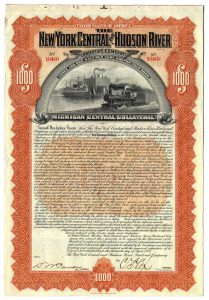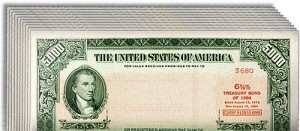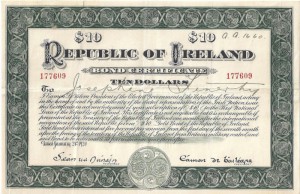What are Bonds? Bonds are a type of "debt instrument" frequently issued by corporations and governments. Typically they have a "par value" of 100 (or 1000). Par value, aka. "nominal value" is the face value of a bond. However, bonds can trade at a premium or discount to face value but at the end of its term, the borrower (i.e. government or corporation) must pay the lender (i.e. investor, aka. creditors or debtholders) the face value. During the term of the loan, the borrower makes interest payments to the lender based on the face value and the listed interest rate (aka. coupon rate). Bonds can be issues for fairly long terms i.e. 20 or 30 years so interest rates can change drastically … [Read more...]
Effect of Inflation on Bonds Part 2
Effect of Inflation on Bonds While inflation has hardly taken center stage among our economic woes of late, there are some credible voices in economics who are already warning of its dangers down the road. Since the FED has already locked itself into rock-bottom interest rates for the foreseeable future, if the economy does not surprise us with a great rebound in the next few years the Fed will have to resort to its one remaining tool, i.e. an expansionary monetary policy, adopting more aggressive quantitative easing, debt monetizing, and other stimulating (but also inflationary) measures. In short, the FED will have to print more money. At that time, the threat of inflation will be real … [Read more...]
Worried About Inflation – Consider Inflation Indexed Bonds
Inflation-Indexed Bonds (aka i-Bond)- Although inflation is currently low it is still a key concern for investors, because with interest rates at record lows and the FED promising to keep them there for the foreseeable future even a small uptick in inflation can prevent an investor from achieving a real return on investment, as returns on investment fail to beat inflation rates. If a return on investment fails to beat inflation, then in real terms you have not earned any money. You may have a larger figure for your total net worth, but in terms of purchasing power this will earn you less as the costs of living increased at a higher rate. On target Inflation is currently tracking at … [Read more...]
US Savings Bonds Are Still A Safe Investment
With interest rates still at record lows, many people are looking for alternatives to savings accounts. US Savings Bonds are a safe and smart investment choice. No other investment carries the full weight of the U.S. government. The U.S. Treasury Department guarantees investors will receive their full principle plus interest. Consider why purchasing savings bonds is an investment that can be made with confidence. US Savings Bonds: Conservative, but Smart Although savings bonds do not yield as much return as higher-risk investments, investors can rest easy knowing they will not loose their money. The financial downturn of the last few years has resulted in many Americans loosing large … [Read more...]
Should I Invest in Inflation Indexed Bonds?
The question of "Should You Invest in Inflation Indexed Bonds?" depends on your personal situation and the current inflationary environment. If you want to have a low risk investment that will keep up with inflation you might consider investing in inflation indexed bonds. Inflation Indexed Bonds When Inflation Rates are High, you might be worried about what's going to happen to your savings. Inflation series bonds are one option to consider. These unique investments have the ability to fight inflation and protect your savings from total devastation. Types of Inflation Indexed Bonds There are two different types of inflation indexed bonds issued by the U.S. Treasury one is called the … [Read more...]
What are T-Bills?
T-Bills Definition: Treasury bills (aka. T-Bills) are short-term debt obligations that are backed by the US government and which have less than a year’s maturity. They are sold in $1000 denominations and purchases can go up to 5 million. Commonly, T-bills come with 4-week (1 month), 13-week (3 month) or 26-week (six month) maturities. The issuing of T-bills is done by a competitive bidding process where the bids are placed on “discounts from par” which means that unlike in the case of conventional bonds with fixed interest rates, here, it is the bond appreciation that gives the holder his returns. For example, if you buy a T-bill with a 13-week maturity at $9,950. What happens here … [Read more...]
What are Treasury Inflation Protected Securities (TIPS)?
As the Government continues to flood the economy with new money via QE1, QE2, Operation Twist and now Twist2, many investors are fearing a massive inflation may be just around the corner. And so they are looking for a sfe haven to protect their investments from the deluge they see coming. Therefore they are turning to Treasury Inflation Protected Securities, or "TIPS". TIPS are considered an extremely low-risk investment as they have Government backing, are protected from the ravages of inflation and are less volatile than bonds and safer than stocks. How Treasury Inflation Protected Securities (TIPS) Protect Against inflation Over time even small levels of inflation can make a big … [Read more...]
What are I bonds?
I- Bonds: A brief overview: In the current shaky economy, everyone is looking for safe and secure investments. Investors might have a chance at high rewards with stocks and corporate bonds, but there’s also a huge risk to putting money in either. The snowballing crises in Europe aren’t making foreign investments look any more tempting. Where can investors trust their finances if they want a solid risk free return on their investment? Well, for those of you who want to play it cool and safe with your investments, you might consider: I bonds. What are I-Bonds? First of all, I-Bonds are officially called Series I Savings Bonds. According to the U.S. Department of Treasury, I bonds … [Read more...]
Impact of Inflation on Bonds Part 2
This page has moved. If you are not redirected shortly please click here. … [Read more...]
Impact of Inflation on Bonds Part 1
Impact of Inflation on Bonds Bonds are often considered a risk-free (or nearly risk-free) investment suitable for "widows and orphans". While they are generally safe, they have several weaknesses in the modern marketplace, inflation, rising interest rates and default risk. Before buying a bond, make sure you understand how bonds work and how inflation can have an effect on bonds. The Nature of Inflation Inflation is often described as the general rise of prices in the economy. However, the increase in prices is merely the effect, called "price inflation." Monetary inflation, which is the expansion of credit in the financial markets, is what often (but not always) drives price inflation. … [Read more...]








